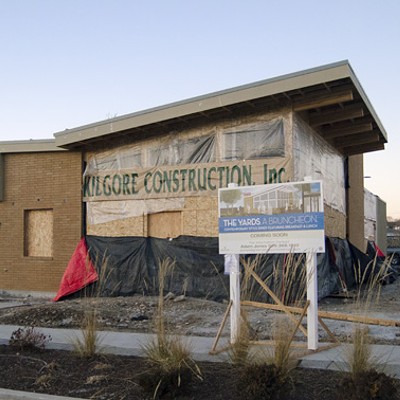Wednesday, December 4, 2013
Mayor announces details of latest ombudsman plan
At a press conference today, flanked by Spokane Police Chief Frank Straub and Spokane Police Guild President John Gately, Mayor David Condon called his latest plan for civilian oversight of the Spokane Police Department "a model for independent civilian police oversight in the state of Washington."
The plan is based on an agreement with the Spokane Police Guild that the Spokane City Council rejected last month based on concerns it didn't go far enough to empower the city's police ombudsman, but now even some of the most vocal council critics are reversing course.
Councilman Steve Salvatori, who led an early effort to empower the ombudsman outside the police department, calls the plan "as good as we're going to get" and says he believes it "satisfies the charter." Citizens voted in February to add language to the charter calling for a "totally independent" ombudsman and a citizen commission to oversee him or her.
The guild agreement allows for the creation of that commission, which the mayor has said he believes adds new independence because the commission (instead of the mayor's office) would have the final say about department investigations with which the ombudsman was unsatisfied. A separate ordinance addresses cases where the ombudsman commission continually feels the police department is not adequately investigating a complaint. It allows the commission to seek review by a third party, like the Washington State Patrol or another city's ombudsman. Neither the agreement nor the ordinance would allow the ombudsman to open his own investigations outside of the police department process, as some community activists have called for. (We wrote about the plan here in this week's issue, and have included the full text of the ordinance at the bottom of this post.)
"I don't know how much farther independent we can get," Guild President Gately said, citing the commission, which will be made up of mayor and city council appointees.
One unanswered question has been whether the guild truly favors this plan or whether it might file an unfair labor practice complaint against the city after the ordinance has passed. At the press conference, Gately refused to assure reporters that the union wouldn't file such a complaint, but Condon promised his legal team would defend it if challenged. (This hasn't always been the case.) UPDATE: Here is a newly released letter from Gately to Straub about the guild's "willingness to work in a Police Department that is both transparent and committed to police professionalism." While seemingly supportive of the administration's plan, it does guarantee the guild will not file a legal complaint.
After rejecting the guild agreement, some believed the mayor would return to the negotiating table with the guild and council members sent the administration a breakdown of their visions of the ombudsman office. In that, Council President Ben Stuckart, who previously told the Inlander, "The TA alone ... just doesn't meet what the voters wanted," described an ombudsman who could open his own investigations outside the police department's internal affairs process. (Most other council members were less specific.) Local oversight advocates, like those at the nonprofit Center for Justice, have called for a similar structure. Because the process of the ombudsman investigating complaints within the internal affairs process was already the status quo before the February charter amendment, they argue citizens were asking for more independence. In its final report earlier this year, the mayor's Use of Force Commission called giving the ombudsman the authority to conduct independent investigations "essential to both establishing objective oversight and building public trust."
From that report:
As a function of human nature, individuals who are part of a group are more likely to favor the interests of the group over “outsiders.” In the context of an investigation into a fellow group member’s alleged misconduct, the peer investigator is apt to be more selective about the investigation’s scope and depth, and may be inclined to avoid a transparent process. All of this behavior can compromise the quality of the investigation and negatively impact the public’s trust in the process and the institution. Conversely, the more independent the investigator, the more likely the investigation will be perceived to be credible to those involved and to the general public.
But the mayor and chief say the current setup, in which the ombudsman sits in on and asks questions during internal affairs investigations, combined with the new commission and the third-party "relief valve," offers the independence citizens want.
"This police department has changed radically in the last 12 months," Straub told reporters today. "We are finally delivering to this community what this community has always wanted: an outstanding police department. And look at what you have: You have the mayor of the city, you have the president of the guild and you have the police chief of this department saying, 'You want more oversight? No problem. You want a commission? No problem. You want to expand the ability of this commission to opine on what the police department does? Absolutely.'"
Straub and others at the city have argued state law prevents them from allowing an ombudsman to open independent investigations because the authority to call on officers to participate in interviews belongs only to the police chief. After an impassioned call on citizens to appreciate the hard work of local police officers, Straub seemed to acknowledge that voters may have had unfair expectations of just how much authority the ombudsman would get when they voted in February.
"To be perfectly honest with you, I think we should have had maybe a broader conversation before we did Prop. 1," Straub said. "But now we have Prop. 1 and I think the mayor and the police department and the guild and the Center for Justice and a whole bunch of other people are demonstrating that we're working on this as hard as we can."
Still, Stuckart and lawyers at the Center for Justice continue to argue that while state law may limit what the city can do by ordinance, there is no limit on what the mayor could have bargained for, and they say he should have negotiated for a fully independent ombudsman.
"They keep repeating that state law is our problem. That's pretty much a falsity," Stuckart says. "I don't believe the chief or the mayor really want a true version of the ombudsman like the Use of Force Commission recommended. Or were they afraid to ask?"
You can share your thoughts about the mayor's plan in a telephone town hall tomorrow at 6 pm (call 888-409-5380), at Friday's Community Assembly meeting in the Council Briefing Center at City Hall (808 W. Spokane Falls Blvd.) or at a town hall meeting Dec. 12 at the West Central Community Center (1603 N. Belt St.).
Here is the full ordinance, which is expected to come to the city council for a vote on Dec. 16:




















